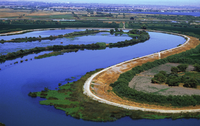-
Water vulnerability in U.S. border region
The Arizona-Sonora region has been called the front line of ongoing climate change, with global climate models projecting severe precipitation decreases and temperature increases coupled with vulnerability from urbanization, industrialization and agricultural intensification
-
-
Robust nanosponges soak up oil again and again
Researchers show that nanotube blocks hold promise for environmental cleanup following oil spills or other disasters; the robust sponge can be used repeatedly and stands up to abuse; a sample nanosponge remained elastic after about 10,000 compressions in the lab; the sponge can also store the oil for later retrieval
-
-
Ion stream to clean up Earth orbit, deflect asteroids
One of the legacies of the space age is an ever-more-crowded near-Earth orbit, where all manner of long-abandoned human-made objects loiter, posing danger to newer space platforms; scientists want to develop a magnetized-beam plasma propulsion device which would be deployed in Earth orbit and which would use a focused ion stream to push dead satellites and other debris toward Earth’s atmosphere, where they would mostly burn up on re-entry; the device could also be used to deflect menacing Earth-bound asteroids hurtling toward Earth
-
-
Diet change required to curb most potent greenhouse gas
N2O is the third highest contributor to climate change behind carbon dioxide (CO2) and methane (CH4), but it poses a greater challenge to mitigate as nitrogen is an essential element for food production; it is also the most potent of these three greenhouse gases as it is a much better absorber of infrared radiation
-
-
In environmental disasters, families experience conflict, denial, silence
Environmental disasters affect individuals and communities; they also affect how family members communicate with each other, sometimes in surprising ways; the researchers say that the findings were, in some ways, counterintuitive
-
-
Southern sea levels rise dramatically
Sea levels have risen about twenty centimeters in the South West Pacific since the late nineteenth century, a new scientific study shows
-
-
Most states in U.S. unprepared for growing water threats to economy, health
Only nine states in the United States have taken comprehensive steps to address their vulnerabilities to the water-related consequences of changes in climate — rainfall events which increase flooding risks to property and health change, and drought conditions which threaten supply for municipalities, agriculture, and industries — while twenty-nine states are unprepared for growing water threats to their economies and public health
-
-
Miniature sensors to advance climate studies, battlefield detection
Self-sealing valves are not only better for collecting reliable climate information – they also increase data reliability for airborne industrial and battlefield gas detection and point-of-contact medicine
-
-
Stormy weather in Europe's future
Europeis likely to be hit by more violent winter storms in the future; a new study into the effects of climate change has found out why
-
-
U.S. Navy experience shows climate alterations
The U.S. Navy reports that because of its worldwide presence, it sees the effects of climate change directly; and expert tells a scientific audience at Sandia Lab that disparities in current climate science projections “mean that the Navy should plan for a range of contingencies, given our limited ability to predict abrupt change or tipping points for potentially irreversible change”
-
-
Researchers use electricity to generate alternative fuel
Scientists show that we can use electricity to power our cars — even if these cars are not electric vehicles; the researchers demonstrated a method for converting carbon dioxide into liquid fuel isobutanol using electricity
-
-
Water scarcity in California's Bay-Delta necessitates “hard decisions”

Simultaneously attaining a reliable water supply for California and protecting and rehabilitating its Bay-Delta ecosystem cannot be realized until better planning can identify how trade-offs between these two goals will be managed when water is limited
-
-
Developing crop for livestock in dry climates
Scientists at the University of Liverpool are working with international partners to develop new forage crop for the hot and dry climate of regions such as Pakistan and Saudi Arabia
-
-
1930s technology to become 21st century tool against CO2 emissions
Human activity releases 30 billion tons of carbon dioxide into the air each year; a new approach to dealing with the problem has a back-to-the-future glint, leveraging technology that the petroleum industry has used since the 1930s to remove carbon dioxide and other impurities from natural gas
-
-
Earth's crust is slowly being destroyed
New research shows that the Earth’s crust is now undergoing high rates of destruction; the research shows the sharp decrease in the growth of the continental crust indicates a dramatic change in the way the Earth has generated and preserved this crust in the last 4.5 billion years
-
- All
- Regional
- Water
- Biometrics
- Borders/Immig
- Business
- Cybersecurity
- Detection
- Disasters
- Government
- Infrastructure
- International
- Public health
- Public Safety
- Communication interoperabillity
- Emergency services
- Emergency medical services
- Fire
- First response
- IEDs
- Law Enforcement
- Law Enforcement Technology
- Military technology
- Nonlethal weapons
- Nuclear weapons
- Personal protection equipment
- Police
- Notification /alert systems
- Situational awareness
- Weapons systems
- Sci-Tech
- Sector Reports
- Surveillance
- Transportation
Advertising & Marketing: advertise@newswirepubs.com
Editorial: editor@newswirepubs.com
General: info@newswirepubs.com
2010-2011 © News Wire Publications, LLC News Wire Publications, LLC
220 Old Country Road | Suite 200 | Mineola | New York | 11501
Permissions and Policies
Editorial: editor@newswirepubs.com
General: info@newswirepubs.com
2010-2011 © News Wire Publications, LLC News Wire Publications, LLC
220 Old Country Road | Suite 200 | Mineola | New York | 11501
Permissions and Policies
